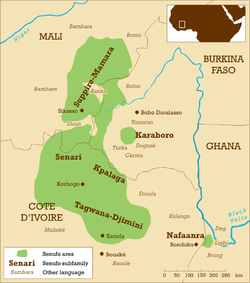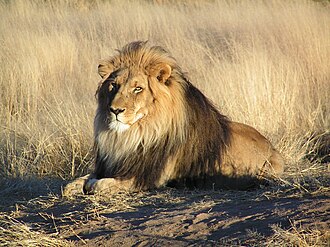Portal:Africa



Africa is the world's second-largest and second-most populous continent after Asia. At about 30.3 million km2 (11.7 million square miles) including adjacent islands, it covers 20% of Earth's land area and 6% of its total surface area. With nearly 1.4 billion people as of 2021, it accounts for about 18% of the world's human population. Africa's population is the youngest among all the continents; the median age in 2012 was 19.7, when the worldwide median age was 30.4. Based on 2024 projections, Africa's population will exceed 3.8 billion people by 2100. Africa is the least wealthy inhabited continent per capita and second-least wealthy by total wealth, ahead of Oceania. Scholars have attributed this to different factors including geography, climate, corruption, colonialism, the Cold War, and neocolonialism. Despite this low concentration of wealth, recent economic expansion and a large and young population make Africa an important economic market in the broader global context, and Africa has a large quantity of natural resources.
Africa is highly biodiverse; it is the continent with the largest number of megafauna species, as it was least affected by the extinction of the Pleistocene megafauna. However, Africa is also heavily affected by a wide range of environmental issues, including desertification, deforestation, water scarcity, and pollution. These entrenched environmental concerns are expected to worsen as climate change impacts Africa. The UN Intergovernmental Panel on Climate Change has identified Africa as the continent most vulnerable to climate change.
The history of Africa is long, complex, and varied, and has often been under-appreciated by the global historical community. In African societies the oral word is revered, and they have generally recorded their history via oral tradition, which has led anthropologists to term them "oral civilisations", contrasted with "literate civilisations" which pride the written word. African culture is rich and diverse both within and between the continent's regions, encompassing art, cuisine, music and dance, religion, and dress.
Africa, particularly Eastern Africa, is widely accepted to be the place of origin of humans and the Hominidae clade, also known as the great apes. The earliest hominids and their ancestors have been dated to around 7 million years ago, and Homo sapiens (modern human) are believed to have originated in Africa 350,000 to 260,000 years ago. In the 4th and 3rd millennia BCE Ancient Egypt, Kerma, Punt, and the Tichitt Tradition emerged in North, East and West Africa, while from 3000 BCE to 500 CE the Bantu expansion swept from modern-day Cameroon through Central, East, and Southern Africa, displacing or absorbing groups such as the Khoisan and Pygmies. Some African empires include Wagadu, Mali, Songhai, Sokoto, Ife, Benin, Asante, the Fatimids, Almoravids, Almohads, Ayyubids, Mamluks, Kongo, Mwene Muji, Luba, Lunda, Kitara, Aksum, Ethiopia, Adal, Ajuran, Kilwa, Sakalava, Imerina, Maravi, Mutapa, Rozvi, Mthwakazi, and Zulu. Despite the predominance of states, many societies were heterarchical and stateless. Slave trades created various diasporas, especially in the Americas. From the late 19th century to early 20th century, driven by the Second Industrial Revolution, most of Africa was rapidly conquered and colonised by European nations, save for Ethiopia and Liberia. European rule had significant impacts on Africa's societies, and colonies were maintained for the purpose of economic exploitation and extraction of natural resources. Most present states emerged from a process of decolonisation following World War II, and established the Organisation of African Unity in 1963, the predecessor to the African Union. The nascent countries decided to keep their colonial borders, with traditional power structures used in governance to varying degrees. (Full article...)
Selected article –
The Fasil Ghebbi (Amharic: ፋሲል ግቢ) is a fortress located in Gondar, Amhara Region, Ethiopia. It was founded in the 17th century by Emperor Fasilides and was the home of Ethiopian emperors. Its unique architecture shows diverse influences including Portuguese, Hindu, and Arab characteristics. Because of its historical importance and architecture, the fortress was inscribed as a UNESCO World Heritage Site in 1979. Ghebbi is an Amharic word for a compound or enclosure.
The complex of buildings includes Fasilides' castle, Iyasu I's palace, Dawit III's Hall, Empress Mentewab's castle, a chancellery and library from Yohannes I, a banqueting hall from the emperor Bakaffa, stables, and three churches: Asasame Qeddus Mikael, Elfign Giyorgis and Gemjabet Mariyam. (Full article...)
Featured pictures –
Did you know (auto-generated) -

- ... that goalkeeper Sophie Whitehouse, who has lived in England, Africa and the US, has been chosen to play soccer for the Republic of Ireland?
- ... that after anti-apartheid activist David Rabkin was sentenced to prison in South Africa, he gave the courtroom the clenched-fist black power salute?
- ... that women seeking abortions in Eswatini or in Lesotho may travel to neighbouring South Africa, where it is legal?
- ... that desert kites in the Middle East and North Africa were used as traps for wild game?
- ... that one way to tell the African dusky flycatcher apart from the ashy flycatcher is that the former is "cuter"?
- ... that African-American journalist Erna P. Harris was called a "fearless critic" of the internment of Japanese Americans by the US government during World War II?
Categories
Selected biography –
Paul Kagame (/kəˈɡɑːmeɪ/ ⓘ kə-GAH-may; born 23 October 1957) is a Rwandan politician and former military officer who has been the President of Rwanda since 2000. He was previously a commander of the Rwandan Patriotic Front (RPF), a rebel armed force which invaded Rwanda in 1990. The RPF was one of the main belligerents of the Rwandan Civil War and was the armed force which ended the 1994's Rwandan genocide. He was since considered Rwanda's de facto leader while Vice President and Minister of Defence under President Pasteur Bizimungu, up to his 2000's election as Rwanda's 4th president and the abolition of the vice-presidential position.
Born to a Tutsi family in southern Rwanda that fled to Uganda when he was two years old, Kagame spent the rest of his childhood there during the Rwandan Revolution, which ended Tutsi political dominance. In the 1980s, Kagame fought in Yoweri Museveni's rebel army becoming a senior Ugandan army officer after many military victories led Museveni to the Ugandan presidency. Kagame joined the RPF, taking control of the group when previous leader Fred Rwigyema died on the second day of the 1990 invasion. By 1993, the RPF controlled significant territory in Rwanda and a ceasefire was negotiated. The assassination of Rwandan President Juvénal Habyarimana set off the genocide, in which Hutu extremists killed an estimated 500,000 to 800,000 Tutsi and moderate Hutu. Kagame resumed the civil war and ended the genocide with a military victory. (Full article...)
Selected country –
 |
 |
||

| |||
Senegal (French: le Sénégal), officially the Republic of Senegal, is a country south of the Sénégal River in western Africa. Senegal is bounded by the Atlantic Ocean to the west, Mauritania to the north, Mali to the east, and Guinea and Guinea-Bissau to the south. The Republic of The Gambia lies almost entirely within Senegal, surrounded on the north, east and south; from its western coast, Gambia's territory follows the Gambia River more than 300 kilometers (190 mi) inland.
The Senegalese landscape consists mainly of the rolling sandy plains of the western Sahel which rise to foothills in the southeast. Here is also found Senegal's highest point, an otherwise unnamed feature near Nepen Diakha at 581 m (1906 ft). The northern border is formed by the Senegal River; other rivers include the Gambia and Casamance Rivers. The capital Dakar lies on the Cap-Vert peninsula, the westernmost point of continental Africa. The local climate is tropical with well-defined dry and humid seasons that result from northeast winter winds and southwest summer winds. (Read more...)
Selected city –
Rabat (/rəˈbɑːt/, also UK: /rəˈbæt/, US: /rɑːˈbɑːt/; Arabic: الرباط, romanized: ar-Ribāṭ) is the capital city of Morocco and the country's seventh-largest city with an urban population of approximately 580,000 (2014) and a metropolitan population of over 1.2 million. It is also the capital city of the Rabat-Salé-Kénitra administrative region. Rabat is located on the Atlantic Ocean at the mouth of the river Bou Regreg, opposite Salé, the city's main commuter town.
Rabat was founded in the 12th century by the Almohads. After a period of growth, the city fell into a long period of decline. In the 17th century, Rabat became a haven for Barbary pirates. When the French established a protectorate over Morocco in 1912, Rabat became its administrative center. When Morocco achieved independence in 1955, Rabat became its capital. (Full article...)
In the news
- 12 April 2025 – Sudanese Civil War
- Siege of El Fasher
- Zamzam and Abu Shouk refugee camp massacres
- At least 100 people, including 20 children, are killed in Rapid Support Forces attacks on Al-Fashir and two nearby displacement camps in North Darfur, Sudan, according to the United Nations. (Hindustan Times)
- 11 April 2025 – Immigration policy of the second Donald Trump administration
- The U.S. terminates the temporary protected status of Afghan and Cameroonian nationals. (BBC)
- 10 April 2025 – Land reform in Zimbabwe
- Zimbabwe begins issuing the first financial compensation payments to White Zimbabwean farmers whose farms were seized by Robert Mugabe's government between 2000 and 2002. A total of 740 farmers will be compensated as per the 2020 agreement with the Commercial Farmers' Union. (BBC News)
- 8 April 2025 –
- The death toll from the heavy flooding in Kinshasa, Democratic Republic of the Congo, caused by overflow of the Ndjili River increases to 33 deaths. Hundreds of buildings are completely submerged and thousands of people are trapped in their homes. (NPR) (DW)
Updated: 17:05, 13 April 2025
General images -
Africa topics
More did you know –

- ...that the 1459 Fra Mauro map (pictured) reports that "a junk from India" rounded the Cape of Good Hope in 1420, around 70 years before the navigations of Vasco da Gama?
- ...that the 1998 Sudan famine was caused by human rights abuses in the midst of the Second Sudanese Civil War?
- ...that a smokie is a West African delicacy made by blowtorching the carcass of a sheep or goat without removing its fleece?
- ...that Anne-Marie Nzié, a Cameroonian bikutsi singer, dedicated the song Liberté to President Paul Biya and his party, the Cameroon People's Democratic Movement?
Related portals
Major Religions in Africa
North Africa
West Africa
Central Africa
East Africa
Southern Africa
Associated Wikimedia
The following Wikimedia Foundation sister projects provide more on this subject:
-
Commons
Free media repository -
Wikibooks
Free textbooks and manuals -
Wikidata
Free knowledge base -
Wikinews
Free-content news -
Wikiquote
Collection of quotations -
Wikisource
Free-content library -
Wikispecies
Directory of species -
Wikiversity
Free learning tools -
Wikivoyage
Free travel guide -
Wiktionary
Dictionary and thesaurus




























































































